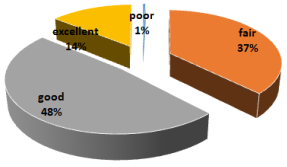Assessment of Waste Management Practices among Residents of Benue South
DOI:
https://doi.org/10.62050/ljsir2024.v2n1.302Keywords:
Gender-Specific, Waste, KnowledgeAbstract
This study aims to assess waste management practices among residents of Benue South employing a descriptive cross-sectional approach. This involves investigating the sources and types of waste generated, the disposal methods used, residents’ perceptions of current waste management practices, and the problems associated with these practices. Through a multi-stage sampling technique, a total of 440 residents were randomly selected and assessed using self and interviewer-administered questionnaires. The major types of household waste generated included food residues, agricultural waste, vegetables, ash, plastics, papers, and urine/excreta. Poor waste management practices were prevalent; 87% of residents engaging in open dumping and 88.6% resorting to burning. The primary challenges identified were lack of waste collection services, lack of funding, lack of environmental awareness, and ineffective enforcement of waste management regulations. The study revealed that the current waste management practices were not satisfactory, as majority of respondents reported encountering environmental problems, such as odors and leachate pollution. The study identified gender-specific differences in awareness, knowledge, and attitude towards waste management practices. Education, income, and age were found to significantly impact awareness, knowledge, and attitude in waste management. Based on the results of the study, it is recommended that the local government should provide more adequate waste collection services, create awareness campaigns to educate the public on the importance of proper waste management, and strengthen the enforcement of existing waste management regulations. In conclusion, this study provides valuable insights into the waste management practices in Benue South.
Downloads
References
Adogu, P., Uwakwe, K., Egenti, K., Okwuoha, A. & Nkwocha, I. (2015). Assessment of waste management practices among residents of Owerri Municipal, Imo State, Nigeria. Journal of Environmental Protection, 6, 446-456.
Taelman, S., Sanjuan-Delmás, D., Tonini, D. & Dewulf, J. (2020). An operational framework for sustainability assessment including local to global impacts: Focus on waste management systems. Resources, Conserv. and Recycling, 162, 104964. https://doi.org/10.1016/j.resconrec.2020.104964
Sharma, K. D. & Jain, S. (2020). Municipal solid waste generation, composition, and management: the global scenario. Social Responsibility J., 16(6), 917-948. https://doi.org/10.1108/SRJ-06-2019-0210
Pardini, K., Rodrigues, J. J., Diallo, O., Das, A. K., de Albuquerque, V. H. C. & Kozlov, S. A. (2020). A smart waste management solution geared towards citizens. Sensors, 20(8), 2380. https://doi.org/10.3390/s20082380
Mor, S. & Ravindra, K. (2023). Municipal solid waste landfills in lower-and middle-income countries: Environmental impacts, challenges and sustainable management practices. Process Safety and Environmental Protection. https://doi.org/10.1016/j.psep.2023.04.014
Seboka, A. D., Ewunie, G. A., Morken, J., Feng, L. & Adaramola, M. S. (2023). Potentials and prospects of solid biowaste resources for biofuel production in Ethiopia: A systematic review of the evidence. Biomass Conversion and Biorefinery, 1-32. https://doi.org/10.1007/s13399-023-04994-0
Mukheed, M. & Alisha, K. (2020). Plastic pollution in Pakistan: Environmental and health implications. J. Pollut. Effects Contr., 4, 251-258.
Abubakar, I. R., Maniruzzaman, K. M., Dano, U. L., AlShihri, F. S., AlShammari, M. S., Ahmed, S. M. S., ... & Alrawaf, T. I. (2022). Environmental sustainability impacts of solid waste management practices in the global South. Int. J. of Envtal Res. and Public Health, 19(19), 12717. https://doi.org/10.3390/ijerph191912717
Mama, C. N., Nnaji, C. C., Nnam, J. P. & Opata, O. C. (2021). Environmental burden of unprocessed solid waste handling in Enugu State, Nigeria. Envtal Sci. and Pollution Res., 28, 19439-19457. https://doi.org/10.1007/s11356-020-12265-y
Lawal, A. S. D. (2004). Composition and special distribution, solid waste collection points in urban Katsina, Northern Nigeria. The Environmentalist, 24, 62-64.
Banga, M. (2013). Household knowledge attitudes and practices in solid waste segregation and recycling: The case of urban Kampala. Zambia Social Science Journal, 2, 27-39.
Modebe, I. & Ezeama, N. N. (2011). Public health implication of household solid waste management in Awka South East Nigerian. The Journal of Public Health, 1.
Ogola, J.S., Chimuka, L. & Tshivhase, S. (2011). Management of municipal solid wastes: A case study in Limpopo Province, South Africa. Integrated Waste Management, 1. http://www.intechopen.com/books/integrated-waste-management-volume-i/management-of-municipal-solid-wastes-a-case-study-in-limpopo-province-south-africa
Adeyemo, F. O. & Gboyesola, G. O. (2013). Knowledge, attitude and practices on waste management of people living in the University Area of Ogbomso, Nigerian. Int. J. of Env. Ecology, Family and Urban Studies, 3, 51-56.

Downloads
Published
Issue
Section
License
Copyright (c) 2024 Lafia Journal of Scientific and Industrial Research

This work is licensed under a Creative Commons Attribution-NonCommercial-ShareAlike 4.0 International License.









